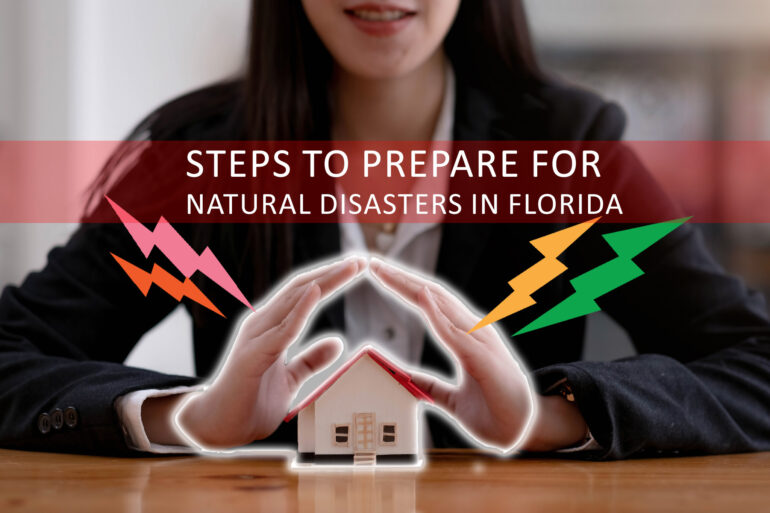Steps to Prepare for Natural Disasters in Florida
There is an old saying: “A stitch in time saves nine.” It means it is better to solve a small problem right away than to address much greater destruction down the road. This sewing metaphor extends to investment properties as well!
While it is easy to do the bare minimum, taking the extra time to ensure a property is weather ready will save you time, money, and likely emotional stress in the event of a natural disaster.
Florida Has Its Fair Share of Natural Disasters
Florida is one of the most popular states for owning rentals. With its close access to beaches and tropical climate, people flock from all over the world to vacation or reside in Florida’s sunny environment. The tradeoff for this advantage is the responsibility of owning a rental in a tropical climate zone. The state of Florida is home to a variety of weather emergencies such as hurricanes, sinkholes, tornadoes, and floods.
The preservation of investment properties and the safety of tenants should be an investor’s top priority. Landlords should educate themselves on how to prepare their rental properties for the multitude of emergencies that can occur.
Of all the natural disasters, hurricanes and tropical storms are what Florida is most known for. According to the Orlando Sentinel, the most deadly was Hurricane Irma in 2017. This recent hurricane caused at least 87 deaths, some of which were senior citizens who died of hyperthermia due to the air conditioning losing power.
This was a tragic example of how high winds and heavy rains are not the only dangers in a powerful storm. As a landlord, it is your responsibility to think of both the obvious and the less obvious work that is to be done to prevent as much loss as possible.
Generators Are Crucial for Vulnerable Individuals
During any severe storm, power outages are common. Having a whole house generator in your rental home can be a major selling point, especially for tenants who are elderly, work from home, or have small children. Being able to charge electronics and connect to the internet has become increasingly vital, and in areas affected by hurricanes, a whole house generator protects that utility.
Tenants will not have to worry about refrigeration failing and food spoilage. Most importantly, those with medical conditions will have the peace of mind that in a storm, they will not be at risk of additional complications due to heat and loss of power for medical devices.
According to SeniorLiving.org, Florida holds the largest number of senior citizens in America. Having a generator in your rental home can provide additional support in a disaster for this vulnerable demographic.
Shutters Protect Your Windows and Home
Any resource on hurricane preparedness will always list the installation of shutters among its recommendations. Shutters prevent wind (and subsequently all of the debris that the wind will carry) from blasting through your windows and damaging your home. In Florida, landlords are not specifically required to provide storm shutters, but it is in your best interest to do so.
According to AccuWeather.com, during Hurricane Irma, some landlords not only refused to provide shutters but they prohibited their tenants from installing them on their own. Installing the shutters prior to renting the property will ensure that the property is protected from hurricanes and the tenant won’t feel the need to make any adjustments to the property.
HomeAdvisor estimates the cost of installing storm windows to be between $3,500 and $8,800. This is no small expense for many investors, but the cost to replace a hurricane-damaged window is estimated at $400 to $1,000 per window. HomeGuide.com estimates it would cost between $4,500 and $9,600 to replace every window in a three-bedroom house. Replacing windows in your home year after year, sometimes multiple times per year, would become a long-term financial hemorrhage that you don’t need.
What kind of shutters you use will generally depend on budget and preferred aesthetic. The cost will range from $300 to $1,000 per shutter depending on the option you choose.
Storm panels are a good choice if you are trying to keep costs down. These can be time-consuming to install, it’s recommended to have an expert install them if you aren’t mechanically inclined. They also require upkeep and storage as they can oxidize and rust.
Storm panels typically cost between $12 and $16 per square foot. Automatic roll down shutters roll into a box when not in use. They are more costly (ranging from $30-$35 per square foot) but easier to use. This is ideal for elderly tenants and tenants who may not be able to reliably use and maintain storm panels. The shutters on your rental property will not be beneficial to your property if your tenant is unable to use them in a storm.
Accordion shutters are also permanently affixed to the window and are easy to use. Regardless of what style of shutters you install, it is important to plan ahead and install them in plenty of time, ideally prior to hurricane season.
Hurricanes, tornadoes, and tropical storms can cause tremendous damage to properties via wind damage. As the property owner, you will want to check periodically to ensure that your property is not susceptible to damage. If your home has siding, make sure that it is not loose. If the siding makes noise or moves in high wind, it will need to be reinforced.
Your Roof Should Be Hurricane Ready
According to RoofClaim.com, the average cost to replace a shingle roof ranges between $10,000 and $20,000. Metal roofs are estimated by HomeAdvisor.com to cost around $10,727, but depending on the size and materials can cost up to $90,000.
The fortitude of your roof is not something you want to gamble with during hurricane season. Your roof directly affects the inhabitability of your rental. If damaged, you will be out the cost for replacing the roof as well as your rental income.
The best type of roof for withstanding a hurricane is metal. If you have shingles, be sure to secure them in place prior to hurricane season. If you are in an area that is especially high risk for hurricanes, you can opt for hurricane straps or roof reinforcement to protect your roof from wind damage.
Retrofitting your roof can be a large expense but worth the investment if your roof endures hurricanes year after year.
Prepare Tenants for Their Role in a Natural Disaster
It is important to inform your tenant prior to a hurricane that all lawn furniture, children’s toys, barbecues, and anything that is not secured should be put away. Items can be picked up and tossed around by high winds, damaging the property.
Do not assume that this is self-explanatory. If your tenants are from out of state, they may not be used to hurricane weather and you will need to inform them on how to care for the property during extreme weather.
Many landlords start their hurricane preparations with the lease itself. Include a clause in the lease that communicates clearly your expectations in the event of a hurricane. Your tenant should provide written acceptance of their responsibility to use and maintain the shutters and to secure loose items. It is also important that your tenants know you are relying on them to convey reports of any damage after the fact.
Protect Home Wiring and Basements from Flooding
The state of Florida is encompassed by water and, to a large extent, lies at sea level. Combined with storms and heavy rainfall, this can often result in flooding. You should be aware of whether your property is in a flood zone. You can determine this by checking the FEMA Flood Map.
If your property is in a high-risk area, there are preparations you can make to minimize any potential damage from flooding. FEMA suggests that you work with a licensed contractor to elevate all electrical components (this includes wiring) a minimum of one foot above the base flood elevation level.
If your home has a basement, waterproofing could be a worthwhile investment. This process involves applying sealant materials and then installing drains and sump pumps. Minimizing the amount of water and moisture that enters the basement will not only protect your property from water damage but also the subsequent mold and mildew that results.
Maintain the Outside of the Property to Avoid Causing Wildfires
Florida is also susceptible to wildfires, especially in the spring and summer months. A dry climate combined with increased lightning can cause spontaneous fires in areas where there is uncleared brush or dry debris. Landscaping the property so that brush is cleared and the yard has no overgrown weeds will minimize your risk.
The Federal Emergency Management Agency (FEMA) advises that roofs be non-combustible, using materials such as metal or asphalt. Cleaning your gutters regularly ensures that there is no fuel for any potential fire.
Florida Forest Service Field Office offers a guide on the various zones of any property and how to best prepare each zone. It is important to provide clear instructions to your tenants on your municipality’s stance on bonfires and burning yard waste.
Acquire the Right Insurance for Your Property
As with any property you own, you must invest in the right insurance for your needs. In addition to purchasing a comprehensive homeowners insurance policy, add on additional insurances based on your property’s risk zones. Obtain several quotes so that you get the fullest coverage for the best rate.
This can take some researching as many disaster insurances such as hurricane insurances are already included in the homeowners policy. According to Clovered.com, hurricane insurance is required for any mortgage holder in Florida and exists as an extra deductible. Flood insurance is usually not included, and you will want to look into purchasing it if you live in a flood zone.
You may also consider requesting or requiring that your tenants have renters insurance. In an emergency, your homeowner’s insurance will cover damage pertaining to the building, but your tenant’s belongings, relocation costs, and hotel expenses are not covered.
This can lead to confusion, disputes about who is responsible, and general inconvenience. Renters insurance can make a stressful time less aggravating by alleviating this. Many renters can bundle their renters insurance with their car insurance for a barely noticeable increase in premium.
Natural Disasters Are Scary, But You Can Be Prepared
By taking the time to prepare, you will have one less thing to worry about in a natural disaster. Every location in the world will have its own drawbacks and risks to plan for.
Florida is no exception, but it also offers incredible benefits for investors who are willing to put in the work. With the proper research and planning, your investment plans can continue to thrive with minimal interruption.








